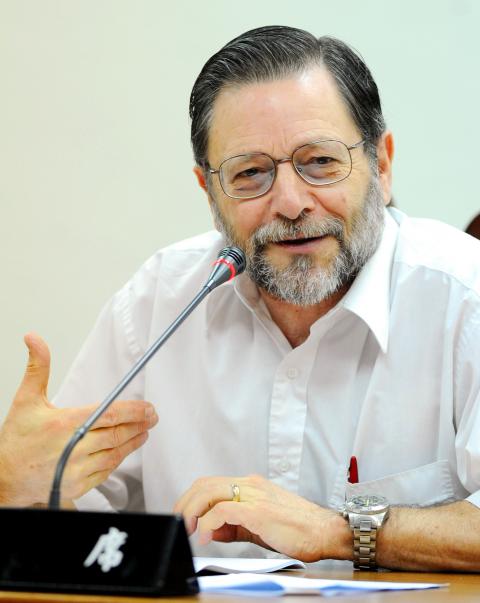Taiwan should focus on its colonial history and the issue of de-colonization, rather than the argument over independence and unification, an Australian academic told a symposium yesterday.
Bruce Jacobs, a professor at Monash University in Australia, discussed the democratization of Taiwan at a symposium held at the legislature and organized by Democratic Progressive Party (DPP Legislator Mark Chen (陳唐山), the Institute of National Defense and Strategy Research and the Association of Taiwan University Professors.
Taiwan is already an independent country and it should focus more on the study of decolonization and transitional justice, because the debate on independence and unification was pointless, Jacobs said.

Photo: Wang Yi-sung, Taipei Times
Citing a poll conducted at regular intervals by National Chengchi University’s Election Study Center, Jacobs said that more than 90 percent of Taiwanese supported either immediate independence or maintaining the “status quo” before moving toward future independence, while less than 2 percent favored immediate unification.
“The percentage who self--identify as Taiwanese exceeded 50 percent, not during the DPP administration, but after President Ma Ying-jeou (馬英九) came into office [in 2008]. To me that’s symbolic,” he said, adding that it implied the unification-independence debate was meaningless.
Jacobs, who was the first foreign academic to research vote-buying in Taiwan for his doctoral thesis in the 1970s, said Taiwanese should instead pay attention to its colonial past.
Observing the democratization process in Taiwan, Jacobs said there had been less violence in Taiwan than in other countries, and the 15 percent to 20 percent of swing voters, who make regime change possible, had made a great contribution to democracy.
Jacobs also said that while former president Chiang Ching-kuo (蔣經國) had “liberalized” Taiwanese politics, he “neither freed nor democratized” Taiwan.
“In my opinion, no Taiwanese president had democratized Taiwan until former president Lee Teng-hui (李登輝),” he added.
Like many countries, Taiwan needed to go through a period of decolonization and transitional justice before finding its true identity, he said.
A declaration of independence could result in war and was not necessarily in the best interest of Taiwanese, he said, adding that official diplomatic relations with other countries are not required to develop meaningful bilateral ties.
Speaking to a group of mainly independence supporters, Jacobs said: “I might offend some of you, but I have to say that the declaration of the establishment of the Republic of Taiwan might not put your in a better situation.”
“There are only four consolidated democracies in Asia — Japan, India, South Korea and Taiwan. Regardless of whether you like the current administration or not, democracy is a precious asset,” he said.
Leaders in Asian authoritarian regimes, such as China and Singapore, love to stress so-called “Asian values” and says that Western democracy is not suitable for Asians, but “we all know that is not true,” former National Security Council deputy secretary-general Parris Chang (張旭成) said.
Democracy and the fight for democracy are the best weapons Taiwanese had against the then-Chinese Nationalist Party (KMT) regime as well as Beijing today, because “both of them are afraid of democracy,” Chang said.

Taiwan is stepping up plans to create self-sufficient supply chains for combat drones and increase foreign orders from the US to counter China’s numerical superiority, a defense official said on Saturday. Commenting on condition of anonymity, the official said the nation’s armed forces are in agreement with US Admiral Samuel Paparo’s assessment that Taiwan’s military must be prepared to turn the nation’s waters into a “hellscape” for the Chinese People’s Liberation Army (PLA). Paparo, the commander of the US Indo-Pacific Command, reiterated the concept during a Congressional hearing in Washington on Wednesday. He first coined the term in a security conference last

Prosecutors today declined to say who was questioned regarding alleged forgery on petitions to recall Democratic Progressive Party (DPP) legislators, after Chinese-language media earlier reported that members of the Chinese Nationalist Party (KMT) Youth League were brought in for questioning. The Ministry of Justice Investigation Bureau confirmed that two people had been questioned, but did not disclose any further information about the ongoing investigation. KMT Youth League members Lee Hsiao-liang (李孝亮) and Liu Szu-yin (劉思吟) — who are leading the effort to recall DPP caucus chief executive Rosalia Wu (吳思瑤) and Legislator Wu Pei-yi (吳沛憶) — both posted on Facebook saying: “I

The Ministry of Economic Affairs has fined Taobao NT$1.2 million (US$36,912) for advertisements that exceed its approved business scope, requiring the Chinese e-commerce platform to make corrections in the first half of this year or its license may be revoked. Lawmakers have called for stricter enforcement of Chinese e-commerce platforms and measures to prevent China from laundering its goods through Taiwan in response to US President Donald Trump’s heavy tariffs on China. The Legislative Yuan’s Finance Committee met today to discuss policies to prevent China from dumping goods in Taiwan, inviting government agencies to report. Democratic Progressive Party Legislator Kuo Kuo-wen (郭國文) said

The Ministry of Economic Affairs has fined Taobao NT$1.2 million (US$36,900) for advertisements that exceeded its approved business scope and ordered the Chinese e-commerce platform to make corrections in the first half of this year or its license would be revoked. Lawmakers have called for stricter supervision of Chinese e-commerce platforms and more stringent measures to prevent China from laundering its goods through Taiwan as US President Donald Trump’s administration cracks down on origin laundering. The legislature’s Finance Committee yesterday met to discuss policies to prevent China from dumping goods in Taiwan, inviting government agencies to report on the matter. Democratic Progressive Party